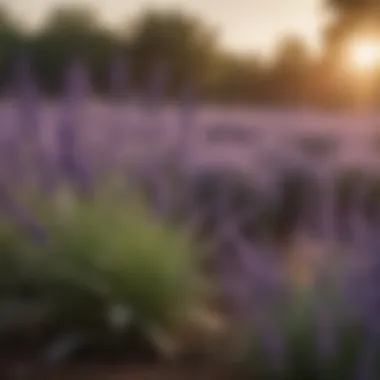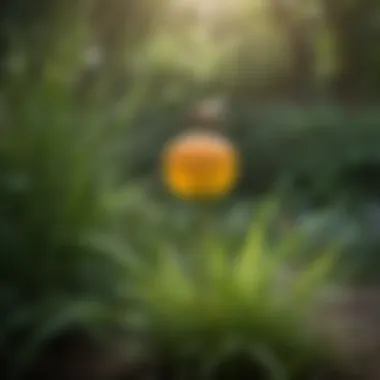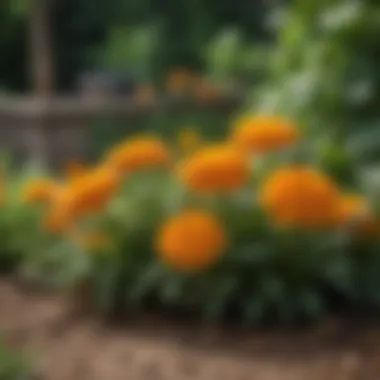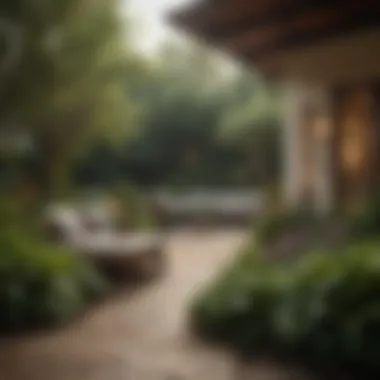Plants as Natural Mosquito Repellent: Efficacy & Application


Intro
Understanding how to manage outdoor spaces effectively is essential, especially when it comes to comfort and pest control. Mosquitoes, as ubiquitous nuisances, can detract from the luxury of outdoor living. By exploring plants as natural mosquito repellents, one can achieve a dual purpose: enhancing the aesthetics of outdoor spaces while actively combating mosquito presence.
This article aims to delve into specific plants known for their efficacy in repelling mosquitoes, shedding light on their underlying mechanisms. It will also examine practical applications for integrating these plants into upscale outdoor environments. The balance between elegance and functionality will be key, ensuring that outdoor spaces not only exude style but also offer a barrier against these bothersome insects. Let's begin our exploration into one of nature's more charming solutions to a persistent problem.
Outdoor Decor Ideas
When designing outdoor spaces, the strategic use of repellent plants can elevate your decor and provide protection from mosquitoes. Integrating plants thoughtfully not only adds beauty but also serves critical functionality.
Plant Arrangements
Consider planting citronella, lavender, and rosemary in arrangements that complement your outdoor furniture. When grouped effectively:
- Citronella offers a vibrant touch with its tall stature, ideal for backdrop planting.
- Lavender boasts a soothing hue; it works well in containers on tables.
- Rosemary, with its distinct shape and aroma, can be placed in both ground and pot arrangements.
These plants can be paired with ornamental grasses or colorful flowers for a luxurious touch while naturally warding off mosquitoes.
Decorative Lighting
Incorporating subtle lighting around these plants enhances ambience. Use solar-powered garden lights to highlight your plant arrangements while providing illumination during gatherings. These lights create a soft glow, enhancing your outdoor decor without overpowering nature.
Sustainable Practices
Opting for organic gardening methods in the care of your mosquito-repelling plants aligns sustainability with elegance. Use compost and natural insect repellents to nourish your plants while protecting the environment. Not only does this practice promote healthier growth, but it also reflects a commitment to eco-friendly living.
Hardscaping Solutions
Creating hardscaped areas, such as patios or pathways, can enhance your outdoor space's functionality. Use permeable materials which allow water drainage but keep the areas neat. Incorporate stone or wooden borders for plant beds filled with mosquito-repelling species. Proper hardscaping minimizes standing water, which is critical in reducing mosquito breeding grounds.
By emphasizing these outdoor decor ideas, one can skillfully merge beauty and practicality, forging a space that is not only inviting but also a sanctuary against unwanted insects.
Prelims to Natural Mosquito Control
Mosquitoes have long been a nuisance for many people across the globe. Their potential to transmit diseases like malaria, dengue fever, and Zika virus elevates this concern to a public health issue. Therefore, understanding natural mosquito control methods becomes crucial. This article investigates the efficacy of various plant species that serve as natural repellents. By employing these plants, one can address both the problem of mosquito infestation and the desire for elegant outdoor spaces.
The Problem of Mosquito Infestation
Mosquitoes are more than just bothersome insects. They reproduce swiftly in standing water, leading to rapid population growth. Even a small amount of stagnant water can serve as a breeding ground. As summers heat up, the number of mosquitoes increases, intensifying the risk of bites and the diseases they carry. Moreover, reliance on chemical repellents raises concerns about toxicity. Conventional insecticides may harm not only mosquitoes but also beneficial organisms, prompting a search for more natural solutions.
Plants as a Solution
Using plants as mosquito repellents offers a multifaceted solution. Certain species emit scents that mosquitoes find unpleasant or disorienting. Importantly, utilizing plants aligns with the growing preference for sustainable and eco-friendly practices in pest control. They can be incorporated creatively into landscaping, providing aesthetic value while effective in reducing mosquito presence. Some popular natural repellents include Citronella, Lemon Balm, and Lavender. These plants can flourish in various settings, from residential gardens to upscale hotel patios. Thus, they form an integral part of an elegant outdoor lifestyle, addressing both form and function effectively.
Incorporating mosquito-repelling plants supports a harmonious balance between nature and luxury living.
Understanding Mosquito Behavior
Understanding mosquito behavior is essential to effectively utilizing plants as natural repellents. This knowledge allows us to identify moments and environments where these plants can be most beneficial. By exploring the attractants and repellents that influence mosquito presence, we can tailor our approaches for maximum efficacy. This section will delve into these elements, shedding light on the interplay between mosquitoes and their surroundings.
Attractants and Repellents
Mosquitoes are drawn to specific stimuli in their environment. Their attraction is usually linked to carbon dioxide, heat, and certain body odors produced by lactic acid and other compounds in human sweat. When we understand what attracts mosquitoes, we can be more strategic in our use of repellent plants.
On the flip side, specific scents and chemical compounds can repel mosquitoes. The understanding of these repellents can help cultivate a more effective personal environment. Notable plants, such as citronella, lemon balm, and lavender, produce volatile compounds that may interfere with mosquito sensory receptors, reducing their likelihood of approaching.
By recognizing the balance between attractants and repellents, individuals can choose which plants to incorporate into their outdoor living spaces for practical mosquito control.


The Role of Scent
Scent plays a crucial role in the behavior of mosquitoes. The olfactory sensory system of these insects is highly developed, allowing them to detect odors from long distances. Certain scents can either lure mosquitoes closer or keep them at bay. For example, the strong fragrance of citronella is commonly associated with repelling these pests.
Moreover, the specific chemical composition in the essential oils of these plants influences how effective they are in acting as repellents. A potent repellent often contains a blend of various compounds. For instance, lemon balm emits compounds such as citral and geraniol, both of which can disrupt the mosquito's navigation.
To optimize the influence of scent on mosquito behavior, it's beneficial to place these plants in strategic locations, such as patios or gardens where people gather. Not only does this enhance the outdoor experience, but it creates a natural barrier against mosquitos.
Understanding mosquito behavior is key to utilizing plant power effectively in repelling them.
Key Plant Species for Mosquito Repellency
When considering natural approaches to mosquito control, understanding key plant species that offer repellent properties is fundamental. Each of these plants not only provides botanical beauty but also serves a practical purpose in safeguarding outdoor environments from mosquito activity. Recognizing them can guide individuals in making eco-friendly choices while enhancing their outdoor living spaces.
Lemon Balm: A Versatile Repellent
Lemon balm, scientifically known as Melissa officinalis, is highly regarded for its versatility as a mosquito repellent. This perennial herb emits a strong citrus scent that is found to be effective in warding off mosquitoes. Its leaves can be crushed and used in homemade repellents or planted directly in gardens to create natural barriers.
One of its notable benefits is its easy cultivation. Lemon balm thrives in various conditions, adapting well to both sun and partial shade. This makes it suitable for luxury garden designs that prioritize flora diversity.
Citronella: The Classic Choice
Citronella, from the grass species Cymbopogon nardus, has long been the go-to solution for keeping mosquitoes at bay. It is well-known in candles and repellents. The distinctive lemony aroma masks other scents that attract mosquitoes, effectively making the area less inviting for these pests.
Citronella can be grown in pots or directly in the ground. Relying on this plant can align well with upscale landscape designs, providing both aesthetics and utility.
Lavender: Beauty and Efficacy
Lavender (Lavandula angustifolia) is not only cherished for its beautiful purple flowers but also its effectiveness in repelling mosquitoes. The essential oils derived from lavender are potent in creating a barrier against these insects. Furthermore, its calming scent contributes to an inviting atmosphere for luxurious outdoor spaces.
Lavender requires well-drained soil and full sun, making it a suitable choice for well-designed gardens that emphasize both beauty and functionality. Regular pruning enhances its health and aromatic properties.
Marigold: A Colorful Barrier
Marigolds, particularly Tagetes erecta, are valued for their vibrant blooms and pest-repellent qualities. These flowers contain compounds that deter mosquitoes while attracting beneficial insects like butterflies. This makes marigolds practical as an organic pest control method without compromising visual appeal.
Marigolds flourish in sunny environments, enhancing the color palette of garden designs. Placing them strategically can enhance both the aesthetic and ecological balance of outdoor areas.
Basil: Culinary and Protective
Basil (Ocimum basilicum) is another plant that serves a dual purpose. While widely used in culinary dishes, its strong scent can effectively deter mosquitoes. Variants like Thai basil have even more potent properties, making them beneficial for those who appreciate fine dining experiences outdoors.
Basil grows best in warm temperatures with ample sunlight, making it ideal for patio gardens or terraces where fine dining occurs. Careful maintenance ensures healthy growth, keeping both pests and hunger at bay.
Peppermint: An Aromatic Shield
Peppermint (Mentha × piperita) acts as an aromatic shield against mosquitoes. The menthol content in its leaves is known to repel mosquitoes effectively. Additionally, its refreshing scent can enhance the atmosphere of outdoor spaces, aligning beautifully with any elegant gathering.
This herb grows quickly and requires regular pruning to keep it in check. Its adaptability to container gardening makes it a versatile choice for luxury outdoor settings, where fresh herbs can complement an upscale lifestyle.
Incorporating these plants not only integrates natural pest deterrence into landscape design but also fosters an appreciation for sustainable practices in luxury outdoor living.
Mechanisms of Repellency in Plants
Understanding the mechanisms of repellency in plants is essential for anyone interested in natural mosquito control. It goes beyond simply identifying which plants repel these pests. It involves comprehending how these plants operate at a molecular level to exert their protective qualities. Moreover, this knowledge facilitates the effective integration of these plants into outdoor spaces and lifestyles.
Essential Oils and Their Effects
Essential oils serve as the primary defense mechanism for many mosquito-repellent plants. These oils contain concentrated compounds that can deter insects through various pathways. Research indicates that essential oils may not only disrupt the olfactory receptors in mosquitoes but also interfere with their ability to communicate and find hosts. For instance, oils like citronella and lemon eucalyptus are known for their strong scents, which mosquitoes find unappealing.


Some core points to consider about essential oils include:
- Natural Origin: Essential oils are derived from plants, making them environmentally friendly alternatives to synthetic repellents.
- Versatility: Different oils have unique properties, offering options for individualized preferences in scent and effectiveness.
- Topical Application: Certain essential oils can be used directly on the skin to provide personal protection against bites.
Essential oils act as a natural defense system, making them essential for eco-conscious individuals.
Chemical Compounds and Mosquito Deterrence
Beyond essential oils, the diverse array of chemical compounds found in plants contributes significantly to their mosquito repellency. These compounds often evolve as a defense mechanism against herbivores and pests. For example, the compound known as geraniol, commonly found in lemongrass, exhibits potent mosquito-repelling properties by affecting their nervous system.
Key factors to note regarding chemical compounds include:
- Complex Chemistry: Many plants contain a blend of multiple compounds, enhancing their overall effectiveness. This complexity makes simple identification challenging.
- Selective Effectiveness: Not all compounds repel all mosquito species uniformly. Research often focuses on specific species for targeted solutions.
- Environmental Influence: Factors such as soil quality, climate, and plant health can alter the concentration of these compounds, influencing their overall effectiveness.
Understanding the roles of essential oils and chemical compounds provides invaluable insights into how to harness nature's offerings effectively. By selecting and managing these plants wisely, it becomes feasible to integrate them into living spaces, ultimately achieving a more elegant balance between aesthetics and practicality in pest control.
Cultivation and Maintenance of Mosquito-Repellent Plants
Cultivating and maintaining mosquito-repellent plants is crucial for achieving effective natural pest management. Understanding how to nurture these plants not only ensures their health and longevity but also maximizes their repellent properties. Given the desire for elegance in outdoor spaces, the proper integration of these plants can further enhance the aesthetic value of a given landscape.
Growing mosquito-repellent plants harmonizes functionality with visual appeal, creating a sophisticated outdoor experience.
Optimal Growing Conditions
To successfully cultivate mosquito-repellent plants, creators must consider several environmental factors. Each type of plant has its specific needs, but there are general guidelines that enhance efficacy.
- Lighting: Most mosquito-repellent plants thrive in full sunlight. Ensure they receive at least six hours of direct light each day. For example, lemon balm and citronella flourish in bright locations.
- Soil: Well-draining soil is key for maintaining the health of these plants. A mix that retains moisture but does not become waterlogged is ideal. You can consider adding organic compost to improve soil structure.
- Watering: Regular watering is essential, particularly during dry spells. However, avoid overwatering, as this can lead to root rot. It helps to check the soil moisture before watering.
- Temperature: Many repellent plants prefer warm conditions. Aim to grow them where temperatures range from 60°F to 75°F.
By paying attention to these growing conditions, one can foster robust plants that serve their dual purpose effectively.
Care and Pruning Techniques
Like any plant, mosquito-repellent species require ongoing care and maintenance to promote healthy growth and optimal functionality.
- Fertilization: Top-dressing with a balanced, slow-release fertilizer can provide necessary nutrients throughout the growing season. Be careful not to over-fertilize, as this can diminish essential oils in plants like basil.
- Pruning: Regular pruning encourages bushier growth and allows for better air circulation. Focus on removing dead leaves and spent flowers. For example, with lavender, clipping back about one-third of the plant after blooming stimulates new growth.
- Pest Management: While these plants help deter pests, they can still attract some unwanted species. Use organic insecticidal soap or neem oil if necessary. Always monitor the plants closely to catch any issues early.
- Harvesting: Regularly harvesting leaves not only promotes growth but can also enhance the production of essential oils, increasing the plant's natural mosquito-repellent properties.
Utilizing effective care and pruning techniques reinforces the benefits of cultivating these plants, ensuring they remain vibrant and potent allies in natural pest control.
The successful cultivation and maintenance of mosquito-repellent plants hinge on a balance of environmental conditions, care strategies, and mindful integration into outdoor spaces. These practices ensure an enduring aesthetic and functional value.
Incorporating Plants into Outdoor Living Spaces
Incorporating plants as natural mosquito repellents into outdoor living spaces is a significant theme in this discourse. The beauty of nature can enhance the aesthetics of any space while providing functionality in pest management. By selecting appropriate species, one can create a sanctuary that not only deters mosquitoes but also uplifts the overall ambiance.
Landscape Design Considerations
When designing outdoor spaces, several considerations come to the forefront. The arrangement of plants can influence both their efficacy and visual appeal.
- Placement: Consider placing mosquitoes repellent plants near seating areas or entry points to maximize their effect.
- Variety: A mix of species can contribute to a thriving ecosystem. Combining tall plants like marigolds with shorter varieties such as basil creates visual layers.
- Color Palette: Select plants that align with your desired color scheme. The bright yellows and oranges of marigolds can complement more subdued colors of other plants well.
- Seasonality: Choose plants that will thrive throughout the seasons. For example, while citronella provides summer protection, lavender can maintain beauty and scent even in cooler months.
Involving these elements in landscape design contributes to a well-rounded approach in outdoor aesthetics and pest control.
Container Gardening for Repellents
Container gardening is an excellent approach for luxury outdoor spaces, especially in urban settings where ground planting may not be feasible.
- Flexibility: Containers allow for mobility. You can move plants to where they are most effective against mosquitoes and adjust them based on seasonal changes in the environment.
- Space Efficiency: Ideal for smaller patios or balconies. Properly sized containers can host a variety of repellents, enabling one to maximize the use of limited space.
- Design Cohesion: Elevated planters offer both beauty and practicality. Choosing containers that match the decor can blend well with surrounding furniture.
- Soil Management: Containers provide better control over soil quality and drainage. Ensuring a good mix can enhance plant health and efficacy.
Incorporating plants into outdoor environments not only combats mosquitoes but fosters a connection to nature while enhancing living spaces. This combination of aesthetics and practicality speaks to the luxury lifestyle desired by discerning individuals.


Ecological Benefits of Plant-Based Repellents
The importance of exploring ecological benefits of plant-based repellents cannot be overstated. Utilizing plants as natural mosquito deterrents aligns with sustainable practices that emphasize environmental health. This approach promotes biodiversity while providing effective pest control solutions. Here are key elements to consider:
- Biodiversity Enhancement: Using a variety of plants helps create habitats for beneficial insects and other wildlife. By encouraging a diverse ecosystem, one can ensure a balanced environment that supports various species.
- Natural Pest Management: Plant-based repellents reduce reliance on synthetic chemicals, minimizing potential harm to non-target organisms. This decrease in chemical usage promotes healthier ecosystems.
- Soil Health Improvement: Many mosquito-repelling plants contribute to soil enrichment. Their root systems can prevent erosion and help retain moisture. These plants also support microorganisms, which are crucial for soil vitality.
Supporting Local Ecosystems
Incorporating plant-based repellents plays a significant role in supporting local ecosystems. For instance, native plants not only repel mosquitoes but also attract pollinators such as bees and butterflies. This creates a chain reaction that benefits the local flora and fauna.
Additionally, the use of native repellents minimizes the introduction of non-native species that can disrupt interactions within the ecosystem. Planting citronella or lavender can strengthen local biodiversity while effectively repelling mosquitoes.
Reducing Chemical Pest Control Reliance
The move towards plant-based mosquito control inherently reduces reliance on chemical pesticides. Chemical treatments can have adverse effects on the environment, from contaminating soil and water to harming beneficial insects. By choosing plant repellents, property owners can maintain aesthetic appeal in their outdoor spaces while minimizing chemical exposure.
This transition not only benefits individual gardens but also contributes to larger environmental goals. Supporting eco-friendly practices resonates with the upscale market's growing interest in sustainable living. Adopting such methods does not sacrifice style for substance but instead enhances the luxury of any outdoor space through responsible management.
"Utilizing plants as natural mosquito repellents integrates ecological consideration into pest control, aligning luxury living with nature's rhythms."
Limitations and Challenges
The use of plants as natural mosquito repellents is not without its difficulties and limitations. Understanding these challenges is essential for those who seek effective pest management solutions. With a focus on practicality, several key factors influence the performance of plant-based repellents in real-world scenarios.
Effectiveness in High-Infestation Areas
In regions where mosquito populations are particularly dense, the effectiveness of plant repellents can diminish. The sheer volume of mosquitoes can overwhelm the natural defenses offered by plants. For instance, while citronella and lemongrass are commonly known for their repellent properties, their efficacy can be significantly reduced in areas like tropical or subtropical zones where mosquitoes breed prolifically.
Several studies indicate that the concentration of essential oils in the plants correlates with their ability to repel mosquitoes. However, in high-infestation areas, the natural compounds may require higher concentrations to be truly effective. This leads to a consideration of practicality versus effectiveness, as higher concentrations may necessitate regular replanning or supplementation.
- Consideration: Effective management strategies in these regions may involve combining plant-based approaches with other methods to create a more comprehensive defense.
Seasonality and Environmental Factors
The performance of mosquito-repelling plants is also influenced by seasonal changes and environmental conditions. Temperature, humidity, and sunlight can drastically affect the oil concentration within the plant leaves, altering their repelling capabilities. In cooler months, certain plants may fail to provide adequate protection because of reduced oil production. This means that even effective species like lavender or peppermint may not be as reliable during specific seasons.
Additionally, environmental stressors such as drought or excessive rainfall may also impact plant health and their ability to repel mosquitoes. A well-maintained plant can provide substantial protection, but stressors can lead to diminished effectivity.
- Key Factors:
- Temperature fluctuations can reduce essential oil output.
- High humidity may enhance effectiveness, but too much water can harm plant health.
Overall, understanding these limitations and challenges is critical for anyone considering plants as mosquito repellents. While plants offer an eco-friendly alternative, they should be viewed as part of a broader strategy in pest management.
The delicate balance between nature and effective pest control requires careful consideration of environmental factors and user expectations.
Finale
The exploration of plants as natural mosquito repellents is essential to understanding modern approaches to pest control. This article highlights the respective efficacies and practical applications of various plant species, underscoring the significance of ecological harmony in pest management. Cultivating plants like citronella and lavender not only deters mosquitoes but also enriches outdoor spaces with beauty and fragrance.
A Natural Approach to Mosquito Management
Adopting a natural approach to mosquito management offers several significant benefits. Firstly, the use of plant-based repellents is safer for humans and pets compared to synthetic chemicals. Unlike traditional insecticides that often have harmful side effects, natural repellents can coexist with residential environments, providing a more pleasant atmosphere.
Moreover, plants act as a sustainable alternative. With a bit of knowledge on proper cultivation and care, one can maintain a mosquito-repelling garden effortlessly. This practice fosters responsibility towards the environment, permitting nature to contribute positively instead of relying heavily on artificial solutions. Additionally, integrating these plants into various outdoor living spaces — be it a luxury patio or a tranquil garden — adds to the elegance while serving a practical function.
Moving Towards Sustainable Solutions
Transitioning towards sustainable solutions in mosquito control reflects a broader movement in eco-conscious living. As consumers and decision-makers in luxury sectors prioritize sustainability, incorporating plants as repellents aligns well with these values. Utilizing plants minimizes dependence on chemical alternatives that may harm local ecosystems and biodiversity.
Furthermore, an emphasis on sustainability advances public awareness. By choosing natural solutions, we inspire others to reconsider their pest control methods, thereby encouraging more eco-friendly choices in their day-to-day lives. This shift is not just about eliminating mosquitoes; it is about fostering a lifestyle that respects nature and promotes well-being in outdoor spaces.
The integration of plant-based solutions represents a critical step towards an elegant and environmentally responsible lifestyle.
In summary, employing plants for mosquito management is not only an effective means of pest control, but it also reinforces commitments to sustainability and environmental health. As our understanding of these natural options grows, so does our potential to harmonize luxury living with ecological mindfulness.







